Obituary: Captain Sir Tom Moore, a hero who gave a nation hope
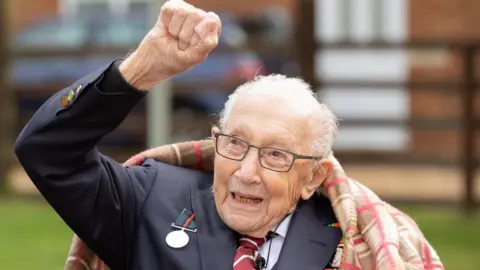 Getty Images
Getty ImagesAt times of crisis, a nation needs hope and heroes.
Sometimes, they're found in unlikely places - and when Britain first locked down against the coronavirus pandemic, it discovered Captain Sir Tom Moore.
In April 2020 the then 99-year-old war veteran accepted a little family challenge: to raise £1,000 for health service charities by walking 100 lengths of his garden before his 100th birthday at the end of that month.
"One small soul like me won't make much difference," he declared in his first TV interview.
He could not have been more wrong.
By the time he closed his fundraising page at midnight on his 100th birthday, Captain Sir Tom had raised more than £32m from more than one-and-a-half-million global donors.
But that was just the beginning - a knighthood, RAF flypast to mark him turning 100 and personal greetings from the Queen and prime minister soon followed.
And he even became the oldest person ever to score a number one single in the UK, when he and Michael Ball sang a cover of You'll Never Walk Alone.
Yorkshire grit
Captain Sir Tom was born in Keighley on 30 April 1920. His father, Wilson, came from a family of builders; his mother, Isabella, taught children at a local school.
It was a comfortable, middle-class background, but a decade later came the Wall Street Crash. It triggered a world-wide economic depression which hit Yorkshire mill towns hard.
A quarter of the British population struggled to feed themselves. Young Tom was surrounded by long lines at soup kitchens, and classmates suffering from rickets and tuberculosis.
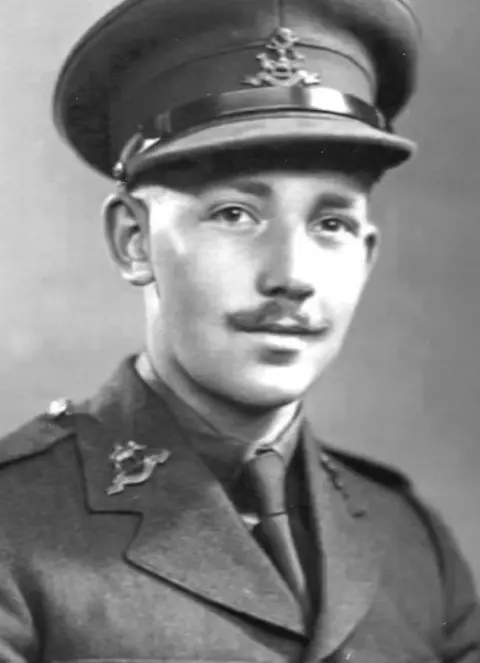 @captaintommoore
@captaintommooreBright enough to win a place at grammar school, he found he enjoyed working with his hands more than reading books.
"I was always a very practical boy," he recalled. "The sort of toys I liked would be a piece of wood, some nails and a hammer."
But his real passion was motorbikes. At the age of 12, Captain Sir Tom discovered one lying in a barn and bought it for half a crown. He proudly took it home, and lovingly did it up.
He left school to start an apprenticeship in civil engineering, but there was barely time to finish it before World War Two broke out.
Conscripted into the British army in June 1940, Captain Sir Tom joined the Duke of Wellington's regiment - an infantry battalion with historic links to the West Riding.
Too young to feel frightened
By his own admission, he was "too young to feel frightened". Indeed, for a practically-minded motorsport enthusiast barely out of his teens, the British army was a thrilling place.
Captain Sir Tom spent time in Cornwall, preparing to defend the coast from a German invasion, and learned how to drive tanks.
Selected for officer training, he became a second lieutenant on his 21st birthday, and - now part of the 146th Royal Armoured Corps - found himself posted to India.
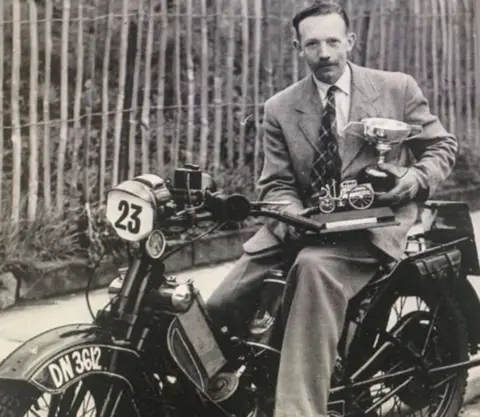 @captaintommoore
@captaintommooreWith the Suez Canal closed, the sea journey took six perilous weeks. The convoy inched around the southern tip of Africa, at constant risk from German submarines.
The train ride across India took nearly as long, the burning heat made only slightly less unbearable by huge blocks of ice scattered among the troops.
Their final destination was Burma, where the British army and its Indian allies had been forced into a fighting retreat by a seemingly unstoppable Japanese advance.
Captain Sir Tom was joining the bruised and bloodied "forgotten army", which was suffering from disease and low morale. It was fighting in the world's least hospitable terrain, with impenetrable jungle, poisonous snakes, and hot lashing rain for six months of every year.
Much of the fighting was done hand-to-hand, with no quarter given on either side. Years later, Captain Sir Tom clearly recalled staring into the "whites of the eyes" of the opposing troops.
With his knowledge of motorbikes, Captain Sir Tom was asked to train dispatch riders. Radio transmissions could be intercepted, so this was the best means of getting information to and from the front line.
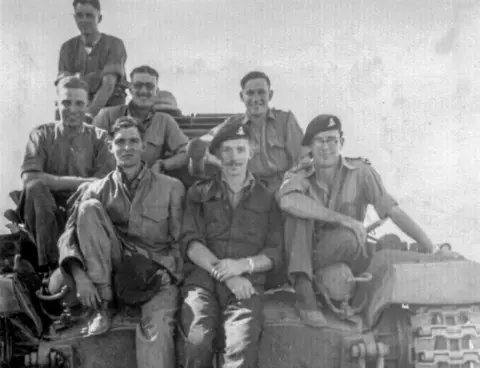 @captaintommoore
@captaintommoore'Poisoned chalice'
It was dangerous work. Dispatch riders worked alone and at night. The roads that did exist were deeply rutted and thick with mud, and the risk of ambush was ever-present.
Captain Sir Tom loved the motorbikes, but described the job as a "poisoned chalice". Once the engine started, there was no stopping or going back.
"If it didn't go well," he said bluntly, "I was dead".
Slowly, the 14th army turned the tide in Britain's favour. Over the next two years, Captain Sir Tom's team helped cut Japanese supply lines along the Burmese coast.
One notable occasion was the battle for Ramree Island in 1945. More than 1,000 Japanese infantrymen were forced into a mangrove swamp infested by salt-water crocodiles. Only a handful emerged.
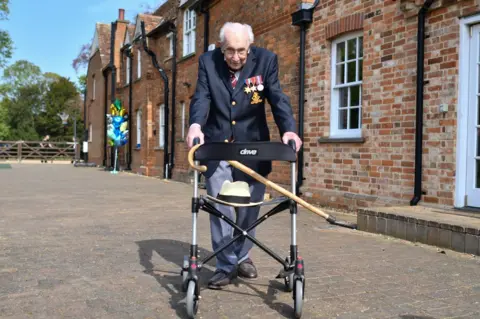 Getty Images
Getty ImagesBy this time, Captain Sir Tom had survived a nasty bout of dengue fever and been promoted to Captain. With the Japanese finally on the back foot, he returned to England to train recruits in the art of driving tanks.
On VE Day, there were "certain activities in the bar", but Captain Sir Tom's thoughts were with his mates still fighting in the Far East. "They didn't get a day off," he said.
He became an instructor at the Armoured Fighting Vehicle School in Dorset. He loved the work, but was desperately unhappy at home
In 1949, he married his first wife Billie and took a job as a sales manager for a roofing company in his native Yorkshire. The troubled marriage lasted 18 years and did not produce children.
'She looked terrific'
Now in his late 40s, Captain Sir Tom resigned himself to never finding love. Until, a few years later, he met Pamela.
She was 15 years younger and an office manager at the firm's headquarters in Gravesend. Romance blossomed, and Captain Sir Tom began to think of excuses to travel down to Kent.
"She looked terrific to me, like a model," he later told the Daily Mail. "The attraction became stronger and I eventually married her."
Captain Sir Tom raced his beloved Scott motorbikes around Yorkshire, winning various cups and medals. He and Pamela had two children - Lucy and Hannah.
 Reuters
ReutersIn 1992, Captain Sir Tom retired at the age of 72. He was looking forward to retirement but life proved less than kind.
Pamela fell ill with dementia. Captain Sir Tom cared for his wife for two years, and then visited her care home every day until her death in 2006.
A remarkable journey
Not wanting to be alone, Captain Sir Tom moved into his daughter Hannah's home in the Bedfordshire village of Marston Moretaine.
There, his routine seldom wavered: waking early each morning to let the dogs out, followed by a daily jog on a running machine. He allowed himself a few luxuries, including a daily glass of wine in front of the television. Judge Judy was a favourite programme.
Captain Sir Tom was treated for skin cancer and a broken hip, and received "marvellous service" from the NHS. When the world locked down for the coronavirus pandemic, he saw a chance to give something back.
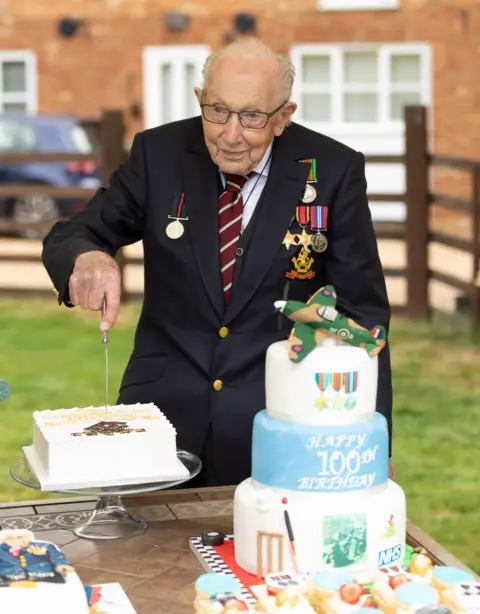 Emma Sohl/ Capture the Light photography
Emma Sohl/ Capture the Light photographyBut a piece in Bedford Today about his sponsored walk mushroomed into a global media event. For millions trapped at home, Captain Sir Tom was a much-needed symbol of defiance, national unity and hope.
"Please remember," he said repeatedly, "tomorrow will be a good day." The money flooded in.
As Captain Sir Tom turned to complete his final lap, the total stood at more than £12m. It would eventually surpass £30m. An honour guard from his old regiment saluted an extraordinary achievement.
His cover of You'll Never Walk Alone, a duet with Michael Ball, raised even more - hitting the top of the charts in time for Captain Sir Tom's hundredth birthday and making him the oldest person ever to score a number one single in the UK.
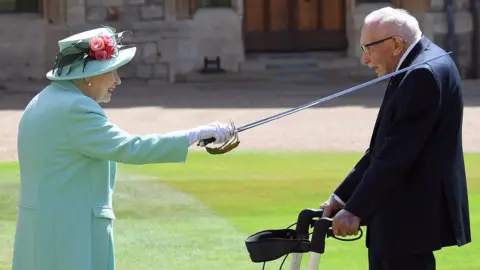 Getty Images
Getty ImagesOn the day itself, a Spitfire wheeled in tribute over Marston Moretaine; a local school volunteered to display 160,000 birthday cards sent to a national treasure.
Captain Sir Tom - promoted to Colonel - did not set out to inspire millions. Like the young lieutenant in 1941, he was just trying to do his bit. The Queen knighted him at a special ceremony at Windsor Castle on 17 July 2020.
With stubbornness, courage and optimism, he was the right man at the right time.
He was Britain as it needed to see itself: selfless, patriotic and undefeated - and never taking a backward step.
